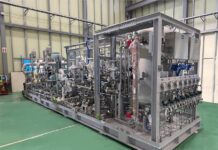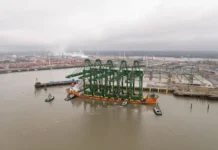
Finnish technology company Wärtsilä has announced it is testing an upgrade to scrubber technology that will cut carbon emissions from existing ships at the point that the exhaust gases are released into the atmosphere.
[s2If is_user_logged_in()]According to the company its extensive research and development into a carbon capture and storage (CCS) system shows that it can develop a system at the scale that is required for the maritime sector.
The company said, “Initial findings show that CCS on ships is technically viable for the sector to pursue. To further accelerate development, Wärtsilä is installing a 1MW pilot plant at its test facility in Moss, Norway. This pilot plant will allow Wärtsilä to test its CCS technologies in a range of scenarios and conditions.”
Wärtsilä believes that CCS technology will take a central role in the decarbonisation of shipping, particularly in the coming decade where many vessels have fitted scrubber technology to remove sulphur emissions from exhaust gases.
“As there is not only one single solution on shipping’s environmental impact, the sector must innovate broadly across multiple areas,” to build on the success of proven technology such as scrubbers, argues Sigurd Jenssen, Director, Exhaust Treatment at Wärtsilä.
Jenssen added that, “Carbon capture is exciting because it can provide significant reductions in a relatively short timeframe. This is important in the context of the industry’s overall decarbonisation transition, as it will enable us to safeguard existing assets as we move to a cleaner mode of operating.”
According to BIMCO more than 40% of Ultra-large container ships, have already been fitted with scrubber technology. Larger ships consume more fuel making the technology more cost effective in larger vessels.
[/s2If]
[s2If !is_user_logged_in()]Please login or register to read the rest of the story[/s2If]





